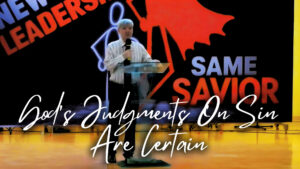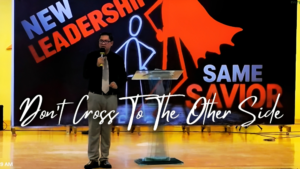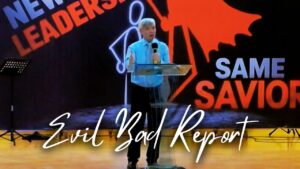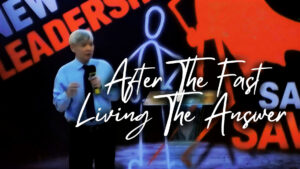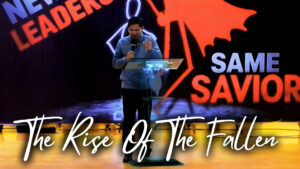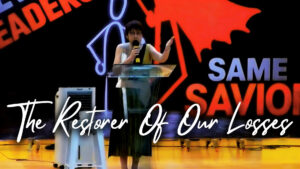Seek The Lost, Remember The Cost
Luke 15: 1- 7
[1]Now all the tax collectors and the sinners were coming near Him to listen to Him.
[2] Both the Pharisees and the scribes began to grumble, saying, “This man receives sinners and eats with them.”
[3] So He told them this parable, saying,
[4] “What man among you, if he has a hundred sheep and has lost one of them, does not leave the ninety-nine in the open pasture and go after the one which is lost until he finds it?
[5] When he has found it, he lays it on his shoulders, rejoicing.
[6] And when he comes home, he calls together his friends and his neighbors, saying to them, ‘Rejoice with me, for I have found my sheep which was lost!’
[7] I tell you that in the same way, there will be more joy in heaven over one sinner who repents than over ninety-nine righteous persons who need no repentance.
The grumbling Pharisees wanted to demonstrate their disapproval of Jesus’ actions, but Jesus didn’t say a word in his own defense; instead, he chose to speak a parable.
The religious leaders were to picture themselves as shepherds. In reality, as leaders of the nation, they should have been serving as shepherds of God’s people.
Title: SEEK THE LOST, REMEMBER THE COST
1. The Circumstance
2. The Challenge
3. The Conduct
Jesus was having a discourse with His audience – His followers and disciples.
He told them this parable in the presence of the publicans and sinners, scribes and Pharisees.
I. THE CIRCUMSTANCE.
The man lost one of his 100 sheep so he went out to look for it leaving the 99.
Who is the lost sheep?
The Publicans and sinners. v1- “Now all the tax collectors and the sinners were coming near Him to listen to Him”.
The Ninety-nine?
Pharisees and Scribes. v2 – ‘Both the Pharisees and the scribes began to grumble, saying, “This man receives sinners and eats with them.”
The Man?
The shepherd – Jesus.
The man left the 99 and went after the 1 lost sheep to find it. And when he found it, he went back rejoicing.
Jesus used the shepherd’s concern for each sheep to set up the question: “Which one of you . . . does not leave . . . and go after the one that is lost until he finds it?”
Any caring shepherd would do so. He would search, find the lost sheep, carry it back to the flock, and rejoice.
II. THE CHALLENGE
The noun ‘man’ is used here instead of the word shepherd. Why man?
Every man is a shepherd. Men are keepers. We are all keepers. We have a task to care for someone or for something.
Every believer is a shepherd. He is pastor, he is a worker, he is the Christian.
I. Seeking The Lost.
The “Publicans” were Jews who worked for the hated Roman government to collect taxes from Jewish citizens. They were assumed to be beyond hope and therefore not worthy of forgiveness.
The publicans were called sinners and considered lost.
– They were lost by circumstances due to their need to survive.
– They were lost by reputation due to their wrong association.
– They were lost by status.
This Lost sheep that the man went out to look for is the lost soul, the marginalized, the blind, the dead in sin.
Like the shepherd:
1. Every man should GO OUT and look for the sinner.
2. Every man must be willing to LEAVE MUCH just to find that precious one.
3. Every man should offer his SHOULDERS to carry the broken.
“Shoulders” in Greek is ōmos (ὦμος) – as that on which burdens are borne.
II. Remembering The Cost.
For the man to seek the lost, there is a cost. He had to pay the price of leaving the 99.
The good shepherd will always return because the 99 listens and will only listen to his voice.
REMEMBER THE NINETY- NINE.
They belong to the fold.
– the blood-washed
– the saved,
– the forgiven
– the chosen
– the kingdom people
– the born again.
– YOU and ME today.
Can be composed of the self-righteous and the elder brothers.
When the man finds the lost, he goes back to his fold. Why?
I. He left them.
Every believer should remember his church. He must care for his church and those who are given to him.
Eg. The statement of a pastor to a couple.
II. They were feeding in the open.
The greek word for “open” translated as wilderness (KJV) is erēmos (ἔρημος).
In Strong’s Definition = desert, wilderness.
In Thayer’s Definition = solitary, lonely, desolate, uninhabited
A. Used of places:
– a desert, wilderness, deserted places, lonely regions, an uncultivated region fit for pasturage.
B. Used of persons:
1. deserted by others, deprived of the aid and protection of others, especially of friends, acquaintances, kindred.
2. bereft, of a flock deserted by the shepherd; of a woman neglected by her husband, from whom the husband withholds himself.
III. There are lambs among them.
There are little ones to feed. – the “least of my brethren” are there.
Matthew 25:40
“And the King shall answer and say unto them, Verily I say unto you, Inasmuch as ye have done it unto one of the least of these my brethren, ye have done it unto me.”
IV. There can be sick and weak ones in the flock.
There are hurting people in the church. There are people who are victims of circumstances and crimes that need our help.
There are fatherless and orphans who need help. There are literally weak and sick members who need help. We have people who come in and they go unnoticed.
Matthew 25:34-40 NLT
“Then the King will say to those on his right, ‘Come, you who are blessed by my Father, inherit the Kingdom prepared for you from the creation of the world. For I was hungry, and you fed me. I was thirsty, and you gave me a drink. I was a stranger, and you invited me into your home. I was naked, and you gave me clothing. I was sick, and you cared for me. I was in prison, and you visited me.’ “Then these righteous ones will reply, ‘Lord, when did we ever see you hungry and feed you? Or thirsty and give you something to drink? Or a stranger and show you hospitality? Or naked and give you clothing? When did we ever see you sick or in prison and visit you?’ “And the King will say, ‘I tell you the truth, when you did it to one of the least of these my brothers and sisters, you were doing it to me!’
The Ninety-nine are in God’s fold, but were left in the wilderness (open). They are the believers in the church, the saved ones, the kingdom people, the heaven- destined, but while waiting for the coming back of their lord, they have a need to be met, they may be in danger of attacks, they may be sick and hurting.
They need the man, the You and Me. The man who has gone through life’s challenges and trials but never forgets his call.
In Luke 22:28-32, “You are the ones who have stood by Me in My trials; and just as My Father has granted Me a kingdom, I grant you that you may eat and drink at My table in My kingdom, and you will sit on thrones judging the twelve tribes of Israel. “Simon, Simon, behold, Satan has demanded to sift you men like wheat; but I have prayed for you, that your faith will not fail; and you, when you have turned back, strengthen your brothers.”
III. THE CONDUCT.
Practice or Praxis?
Practice: The act of doing. The execution of an action or activity.
Praxis: Transformative action. Form of action that aims to change.
When we do something as a practice, we may only be acting. When we do it as a praxis, things change. Practice may end in enduring but praxis will end in enjoying.
The parable of the lost sheep ended in celebration when the man came back after finding the lost sheep. “And when he COMES HOME, he calls together his friends and his neighbors, saying to them, ‘Rejoice with me, for I have found my sheep which was lost!’
This message is not only for the pastors as shepherds of the church but for the “man” in the church.
What can we do to seek and what can we do to care? We can do well to find and we can do better to care.
It takes a good man to seek the lost and remember the cost. It takes a good heart to do such. After all we are only imitating what the Ultimate Man has done for us. But what we can do is nothing compared to what He has done for us. We can give bread and water but He gave His blood. We can sacrifice time and money but he gave His life, His all.
The Ultimate Man – the Good Shepherd, Jesus, left everything in heaven to seek the lost. He did not only come to seek the lost but He beautified the church. He gave us beauty for ashes, oil of joy and garments of praise. One day He is coming back bringing His rewards. Revelation 22:12 “Behold, I am coming soon, and I shall bring My wages and rewards with Me, to repay and render to each one just what his own actions and his own work merit.”
CONCLUSION:
There is a lost sheep that we need to seek. They are the lost soul, the marginalized, the blind, the dead in sin. We should go and find them.
We should also remember the Ninety-nine. They are in the church. We should not forget the left out, the weak, the deprived, the grieving, the little ones and those who are in deep need.
We should be the man who notices someone missing, goes out at all cost and carries him on his shoulders like a shepherd, just as our Lord Jesus the Ultimate Man, who carried the weight of our sins on His shoulder.
What is a piece of bread to an empty stomach? What is a cup of water to the thirsty? What is a warm welcome to a stranger? What is a piece of garment to the naked? What is a visit to the sick and in prison? But great is your reward in heaven.
